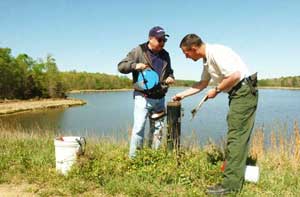Natural Resources Engineer
Tasks & duties

Natural resources engineers may do some or all of the following:
-
meet clients such as district or regional councils, business owners, farmers and developers to discuss their needs
-
visit clients' sites and observe environmental problems
-
carry out surveying and computer-modelling work
-
prepare reports, sketches, working drawings and specifications based on the sites and the clients' needs
-
meet clients, contractors, consultants and other engineers to discuss plans
-
advise clients on how best to use available resources
-
advise on water-quality and treatment issues related to river control, groundwater and surface water resources
-
advise on waste-management systems where waste interacts with the land and surrounding freshwater
-
design water-management solutions such as irrigation, drainage and wastewater disposal
-
make calculations for irrigation systems or catchment sites, by calculating water-flow rates, pump-size requirements and other relevant details
-
write reports, proposals and budgets for proposed sites or systems
-
consult clients, local authorities, the community and other affected parties as part of the resource consent process
-
prepare assessments of environmental effects to accompany resource consent applications
-
prepare contract documents for the contractors
-
visit sites during construction to consult contractors and ensure structures comply with plans and specifications
-
check sites regularly while the structures are being built
-
be expert witnesses at court hearings
Skills & knowledge

Natural resources engineers need to have:
-
knowledge of soil types, natural hazards, irrigation systems, electricity and other sources of energy
-
knowledge of civil engineering
-
knowledge of physics and maths
-
skill in analysing and interpreting information such as client requirements, plans and designs
-
an understanding of the legal, ethical, environmental and cultural issues that surround the use of natural resources
-
knowledge of relevant legislation such as the Resource Management Act, the New Zealand Building Code, local by-laws and town planning regulations
-
problem-solving skills
-
planning and organisational skills
-
good communication skills
-
writing skills for producing reports
Natural resources engineers also need computer skills to use GIS (Geographic Information Systems) and computer-modelling hydraulic and hydraulic software.
Entry requirements
To become a natural resources engineer you need a Bachelor of Engineering, preferably with Honours.
Secondary education
To enter tertiary training Bursary or NCEA equivalent English, maths with calculus, chemistry and physics is preferred.
Tertiary education
The University of Canterbury offers the only specific natural resources engineering degree at the undergraduate level.
However, people can work in natural resources engineering from other engineering disciplines.
Training on the job
Skills are gained on the job. Natural resources engineers may attend courses, seminars, workshops and conferences to keep their skills up to date.
Natural resources engineers may apply to the Institution of Professional Engineers New Zealand (IPENZ) to become a chartered professional engineer (CPEng) after:
-
completing relevant qualifications
-
gaining appropriate work experience (usually four to five years)
-
completing a practical competency assessment
To maintain registration, chartered engineers need to demonstrate their ability to practice and display evidence of undertaking professional development at least every five years.
Registration
Natural resources engineers should be registered with the Institution of Professional Engineers New Zealand (IPENZ).
Useful experience
Experience in surveying, engineering or agriculture is useful for natural resources engineers. Previous work for district or regional councils, or experience and interest in the outdoors and environment may also be useful.
Related courses
Construction Engineering
Environmental Engineering
Water and Sanitary Engineering
For more information, please refer to Career Services.
Document Actions
